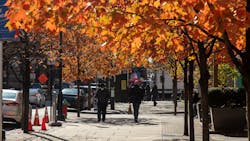Philadelphia reaches settlement in class action case regarding pedestrian access
An agreement in a class action suit will see the city of Philadelphia perform maintenance and make improvements to its curb ramps – a critical piece of civic infrastructure required to ensure all residents and visitors can safety access sidewalks throughout the city. The agreement still requires approval in federal court, but both the city and the plaintiff, Liberty Resources, Inc., et. al., have jointly filed for approval of the agreement.
“We’re grateful that this Agreement will achieve substantial long-term improvements to the City’s pedestrian infrastructure through the installation and upgrade of curb ramps throughout the City of Philadelphia, enhancing access to jobs, schools, and community life for individuals with disabilities that affect their mobility,” said City Solicitor Diana Cortes.
In a statement following the agreement being reached, the city commended Liberty Resources, Disabled in Action of Pennsylvania, Philadelphia ADAPT and Disability Rights Advocates “on their advocacy and assistance in crafting an agreement that will improve accessibility in Philadelphia for years to come.”
Thomas Earle, CEO of Liberty Resources, Inc., the Center for Independent Living serving Philadelphia said, “Accessible streets and sidewalks make our great city safer for everyone, including people with disabilities, this improved compliance fairly resolves our civil rights under the ADA.”
The settlement agreement, if approved, will require the Philadelphia to:
- Install or remediate at least 10,000 curb ramps during the 15-year Settlement Period, with 2,000-ramp milestones every three years.
- Install accessible curb ramps where they are missing and fix curb ramps where they are noncompliant whenever the city newly constructs or alters a road or street with a pedestrian walkway, unless crossing is banned for all pedestrians due to safety concerns or a fully compliant curb ramp is technically infeasible.
- Maintain in operable working condition those curb ramps over which it has responsibility.
- Establish a Curb Ramp Request System for city residents to request installation, remediation or maintenance of ramps at any crossing identified in the settlement. The settlement sets out timelines for prompt investigation and fulfillment of requests.
- Post progress reports on the city’s official website on the number and location of curb ramps installed or remediated under the agreement.
The city says it is hopeful that the court will preliminarily approve the agreement within the next month and, if approved, anticipates a hearing for final court approval to occur in February 2023.
About the Author
Mass Transit Staff Report
Stories under this byline were produced through a team effort by the editorial staff of Mass Transit.
To learn more about our team, click here.
If you have a story idea, let us know by emailing [email protected]. Please review our contributor guidelines found here.
